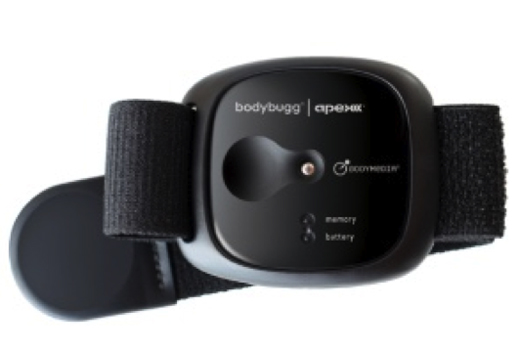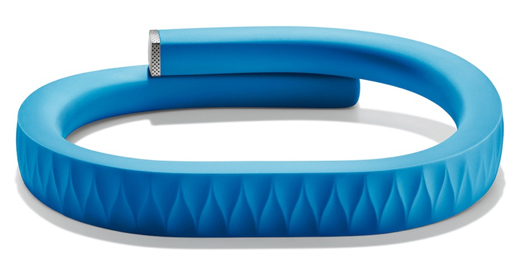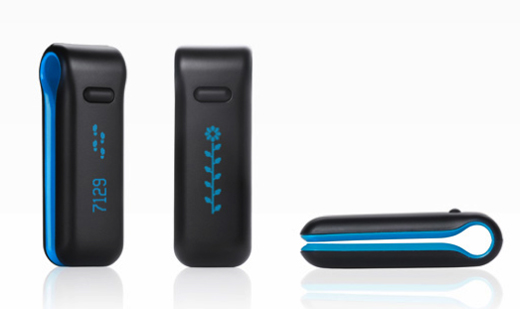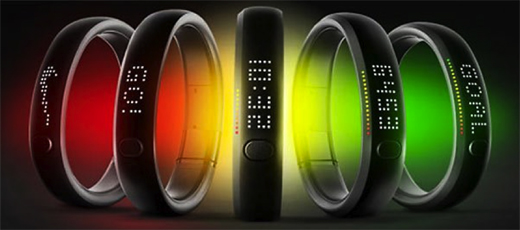
- Writing and research by Asst. Editor Tess Nelson -
Will I fit into my skinny jeans tomorrow without yanking and squeezing? How many calories did I burn running errands, commuting to work, having sex? We’ve all wondered. The fitness and technology industries have aimed to answer these questions by producing several measurement gizmos and gadgets. These fit devices measure your activity from steps taken to calories burned and all claim to be the missing link to your weight loss goals. So which activity measurement is the most rewarding, simple, and affordable? I clear up all the numbers, graphs and myths of these nifty tools so you can monitor your health and wellness with ease and style.

S2H Step (Switch2Health) Pedometer (S2H.com) - $24.95
For fitness junkies, the pedometer is a classic. It simply counts your steps to give you an idea of your overall activity for the day. If you are automatically picturing your neighborhood’s power-walker aggressively checking the gadget on his waist then I beg you to hold your judgments until the end.
Pros
Switch2Health rewards you for racking up the steps. Every 10,000 steps you take your pedometer displays a code for you to enter on the S2H.com website to redeem rewards such as discounted magazine subscriptions and gift cards to Gap, iTunes and other desirable locations. This isn’t some arcade scam where you would need to spend a decade to get raffle tickets and to end up with an eraser. The rewards really are attainable if you walk enough. WALK, not master the odds of skeeball. Just move.
The S2H pedometers come in bright, fun colors that aren’t so serious. The compact gadget is easily covered by a shirt or can be clipped on really anywhere on clothing or undergarments. The mere presence of a pedometer on your hip is a small reminder that when given the chance take a cab or walk or to skip the elevator you could choose the more active option to earn a gift card to your favorite store.
Cons
Screaming in the bathroom because your pedometer snapped off your jeans and fell dangerously close to the toilet bowl is a social faux pas that I, a fitness fanatic and lover of my bright green pedometer, am guilty of. That is the trouble with the pedometer. It is not the sturdiest gizmo if on a thick jean hem or pocket. Because it is so light it is easy to forget it’s there, so it just requires some caution when joining you in the restroom.
In a few words
Simple yet rewarding. Neon colors are fun.

The Bodybugg (bodybugg.com) - $129 to $179 (plus $49.95 for 6 months online subscription)
The Bodybugg is an armband that functions as a calorie management system. The technology measures calories expended throughout wear and combined with a web system that allows you to input your calorie intake, it calculates your overall calorie deficit or surplus.
Pros
Talk about thorough! With 90% accuracy it will measure calories burned and compare with your logged food intake. It provides you with all the information necessary to tackle your own weight loss goals.
Cons
It’s a bit on the obvious side. In order to get the most accurate results one should wear it throughout the entire day. However, wearing it with a sleeveless top at work screams “I’m really flipping serious about managing my weight,” and for me, that’s much too much information to give my co-workers.
The BodyBugg Fashion Straps just scream FLASHY to me, unless you're into zebra...and in that case, don't let me stop ya. Lastly, the BodyBugg Apex Tracking Website itself is terribly grey and downright impossible if you have a short attention span. I need a bright, easy-to-understand website if I’m going to face myself with the daily verdict on my weight loss goals.
In a few words
Thorough but complicated and expensive.

Gym Pact (Gym-Pact.com) - Free app!
If following through on our fitness goals were easy, we wouldn’t need thinspiration, Spanx, or drill sergeant personal trainers to get us moving. The mobile app Gym Pact takes the tough love approach to getting your butt to the gym. You set how many minutes per week you will work out at the gym as well as the price you will pay if you don’t make the goal. Any time you go to the gym you check in on your iPhone, and at the end of the week if you go to the gym as much as you say you will you receive a cash prize that is taken from the people who didn’t work out as much as they said they would.
Pros
Money talks. You get cash prizes for meeting goals that you set! It is a genius way to set realistic goals and feel rewarded for meeting them one week at a time. Plus, they have an awesome blog that is uplifting and inspiring; it’s a little TLC after the tough love pact.
Cons
You can check in at any gym, yoga studio, or pool, but not a home or office workout center. A run outside or a workout DVD at home would not count. Also, currently it is only available on iPhones.
In a few words
Something different to check out. Motivating and rewarding.

UP (Jawbone.com/up) - $99.99
This wristband and iPhone app tracks your activity and sleeping patterns, and allows you to create a photo food journal. The activity includes steps, distance, GPS routes, calories burned and pace, as well as intensity level. At the end of the day it even breaks down active versus inactive time. UP can monitor when you are waking from sleep and then vibrate to fully awaken you (a gentle vibration at the wrist--how nice is that?).
Pros
The range from activity measurement to sleeping patterns is impressive. Plus, the Community section of the website of the UP bracelet suggests challenges for you created by associated fitness centers such as 24 Hour Fitness and other members of the UP community. This provides both information and encouragement.
Cons
This unfortunately is a big con: it was recalled. Poor battery life and other technologic errors had this gadget off wrists and back in the lab after just a few short months. Stay tuned for a reconstructed UP, because it has amazing potential.
In a few words
Impressive but recalled.

FitBit (Fitbit.com) - $99.95 + free shipping
This teensy device measures the steps you’ve taken, distance traveled, calories burned, and even floors climbed. The FitBit also can be slipped on as a wristband to measure your sleep cycle. The bright and simple website displays your stats and then breaks them down into a pie graph of activity level of sedentary, lightly active, fairly active, and very active.
Pros
The website is so easy to understand. Even though the pie graph itself makes me think of dessert, the display gives me the information I want without confusion. It takes the mystery out of activity and sleep time. Plus, it is delightfully small; it can be subtly slipped on a bra!
Cons
It is not totally waterproof so it certainly can’t measure a swimmer’s activity level.
In a few words
Sleek and affordable.

The Nike+ FuelBand (nike.com/fuelband) - $149, Available as of 2/22/12
This brand new wristband took the technology of all fitness and activity measuring systems and combined them and created its own metric for activity known as Nike+ FuelBand. While it does measure the usual, calories burned and steps taken, it uses a unique algorithm to convert all activity into Nike Fuel.
Pros
The Nike+ FuelBand concept is revolutionarily uniting. No matter if you are a professional athlete, Zumba fanatic, student, or all three, Nike+ FuelBand allows you to compare your results with others instead of calories which widely range for different bodies and metabolisms. It gives the normal folks whose activity comes from running after kids, a Pilates class, and errands a chance to earn Fuel comparable to a co-worker with an ungodly fast metabolism. The app even asks you to rate how you feel throughout the day, (finally someone asks!!). It truly puts the fun back into being active and takes the obsession out.
Cons
It won’t tell you how many floors you climbed and doesn’t involve itself in your sleep cycle.
In a few words
Unique and genius!
We think it's kind of obvious which ones make the style cut...
The FuelBand is definitely top of our list. What we want to know is WHICH ONE IS YOUR FAVORITE? Tell us in the comments section below!

